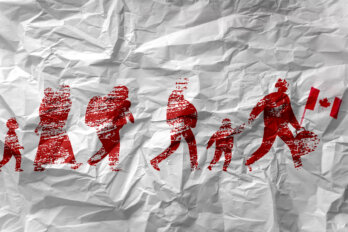W e tend to position work against a series of opposites. Some of these are lauded, or at least tolerated: leisure, play, meditation, contemplation, rest. But one of the antonyms of work is, in most accounts, something of more dubious value: idleness. Apathy and a lack of care; laziness and slothfulness and inaction; indolence and shiftlessness; sluggishness. The synonyms are plentiful, and they take us from stasis and immobility to slow, languorous movement, and from a distracted kind of absent-mindedness to undirected activity with no set intentions. The expenditure of energy with no identifiable benefit, as in a car idling, or the dispersal of thought with no specific direction, as in idle daydreaming. In all these versions, idleness is something for upstanding citizens and responsible adults to studiously avoid.
Exhortations toward work as the path to truth, meaning, virtue, and salvation suggest the contemporary valuation of work is—although not universal—more than the legacy of a single cultural tradition. In the Greek poet Hesiod’s epic poem Works and Days, written in the eighth century BC, we learn, “When you work, you will be much better loved by the gods.” Even in the Garden of Eden, “where there was no neede of labour,” we are told by the English rector John Sakeld in the 1600s, “God would not have man idle.” It wasn’t a material imperative but a spiritual one, something existential. This was not just a Judeo-Christian tradition: work was also “the Way” for seekers of enlightenment in Japan in the 1300s. As explained by the monk and poet Kenkō, “it is a wicked thing to allow the smallest parcel of land to lie idle.” He listed the things that should be planted—food and medicine—as he recounted the teachings of a lay priest who chastised him for his unkempt garden, urging more productive uses of the land.
Some thinkers and writers have interrogated the meaning of work over time: it may seem self-evident to many, as historian Andrea Komlosy writes in her genealogy of the term, something we all intuitively understand. But, “upon closer inspection,” she clarifies, “work proves to be quite the linguistic chameleon: everyone has their own, nuanced definitions, which themselves are in constant flux.” In her project, tracing a thousand years of changing understandings of work, she offers a sweeping definition that ranges from activities for survival to cultural expression to securing luxury and status, from subsistence to market exchange to the exertion of power. A wide-ranging term, then, that brings us beyond waged industrialized work. Komlosy’s project aligns with scholar Cara New Daggett’s extensive history of the changing meanings of energy, where she tracks how we arrive at contemporary perspectives that equate energy with fuel and both with work. The widespread uptake of the science of thermodynamics, with its history in the Scottish Presbyterian world of Glasgow in the 1700s, drove a particular understanding of energy that took on social as well as pragmatic industrial significance, Daggett explains. There is a clarity of sorts in a vision that equates fuel with energy and work—and work with productivity, employment, and morality. Work is understood as the central tool to survive, to prevail, and to succeed in a world that tends toward entropy and dissolution. With such a view, opting out of these equations is to reject progress itself, embracing a form of shiftlessness and even depravity.
But what to make, then, of this counsel from the writer Mark Slouka against filling our time with work: idleness is not just a psychological necessity, requisite for the construction of a complete human being; it constitutes, as well, a kind of political space, a space as necessary for the workings of an actual democracy as, say, a free press.
Slouka expands on this claim in a provocative essay, calling idleness “unconstrained” and “anarchic.” He suggests that idle time provides people with the chance to reflect on their values, beliefs, commitments to justice, and strategies for enacting change. Far from an embrace of sin or a dodge of responsibility, idleness is recast as a political project—and an unsettling one for those in power. “All manner of things can grow out of that fallow soil,” Slouka writes, with indeterminacy at the core of his point. That fallow soil of our imagination, that undirected energy of our independent minds. At rest yet restless, unoccupied yet invigorated. Citizenship, for Slouka, especially a democratic version, requires time and unclaimed intellectual space in which each person can consider what they see as necessary for a flourishing society. Being constantly occupied, whether in waged labour or in commercialized forms of leisure, leaves no space to form our own values and views and ethical judgments and so leaves us ill-equipped to contribute to a collective social and political life. Instead, we are too harried to mount any challenge to inequity, servility, creeping authoritarianism, or even its fully fledged version. Idleness, then, might be a crucial emancipatory project.
A friend from the southern United States, with the self-proclaimed “deep anti-tyranny roots” befitting someone raised in Virginia, once gifted me the anarchist Emma Goldman’s three-volume autobiography. Goldman was born in Lithuania in 1869, then part of the Russian Empire; she fled to the US to escape the pogroms against Jewish people of the 1880s that followed the assassination of the czar. She became a garment factory worker in New York and, soon after, a labour organizer and a staunch anarchist. Anarchy is an oft-maligned term, at least in its misinterpretations. It is regularly understood as chaos, as randomness, as carelessness or violence, as selfishness and self-interest and even nihilism. But these angles offer little insight into a political concept that, at its core, eschews hierarchy as its organizing principle. For Goldman, anarchism paired a fierce belief in the value of the individual with a hopeful account of collective harmony. There was no tension between these, in her account, “any more than there is between the heart and the lungs”—two essential elements of social life that allow for individuals to thrive. Although the language of purity she uses in her work may unsettle readers in the twenty-first century, given the legacy that such ideas carry, her writing was not in service of nationalism or a racial order. The path to harmony, she explained in her pamphlets, was doing away with religion, property, and government: a trio of problematic forces that dominates mind, body, and spirit.
What rules are meaningful and valuable; which ones perpetuate inequality? At what point do we substitute deference to authority with our own autonomous consideration—and what might emerge if we were to choose our own distinct path? To hone our capacity for independent judgment, political scientist James Scott urges a daily practice of “anarchist calisthenics,” a form of small-scale rebellious action that cuts against the grain of authority; he envisions minor acts of law-breaking, in cases where this would not endanger others or undermine social well-being. Hierarchies that bring with them pogroms and violence, oppression and exploitation, are not easily overturned: such recognition of the stability of unjust systems requires him to “confront the paradox of the contribution of lawbreaking and disruption to democratic political change”; law-breaking is needed to break the stranglehold of unjust rule. In Scott’s assessment, “Most of the great political reforms of the nineteenth and twentieth centuries”—among which he describes those for racial equality and civil rights—“have been accompanied by massive episodes of civil disobedience, riot, lawbreaking, the disruption of public order, and, at the limit, civil war.” But, in societies defined by hierarchy, how do we develop the skills for anything else? Scott advises carefully chosen confrontations with imposed laws to assert and practise independence and autonomy without inflicting harm upon others.
Anarchism—or what scholar Marina Sitrin calls the “anarchist spirit,” noting the ideological diversity of anarchic ideas—can involve a vibrant social life, with fundamental operations that rely on collective care emerging without force and coercion. Far from a rejection of society and relationships and care, this understanding of social life suggests that order can arise not from following mandates set by higher authorities—monarchs and dictators, militaries and rulers, or even elected officials vested with enforceable powers—but instead from voluntary, co-operative agreement, continually renewed and renegotiated. Individual judgment is needed to enable this consensual collective.
As socialist scholar and ever-hopeful activist David Graeber wrote, “One cannot know a radically better world is not possible,” and anarchism, at least in some forms, can offer a path to that reimagined world. Idleness as anarchic, then, suggests a kind of self-determination. Slouka proposes that undirected consciousness is crucial for being in community as a meaningful political citizen, an engaged social participant—and, perhaps, an engaged participant in the wider world.
In our definitions and debates, we tend to consider work and the absence of work, or idleness, in human terms. When Kenkō, amid essays on aesthetics and commentary on the lives of his compatriots in the fourteenth century, extols the virtues of a garden of “useful crops,” he fails to reflect on what else is growing in those untended beds. His idle land, among the “spring weeds,” likely hosted a thriving neighbourhood of hardy wildflowers, mosses, shrubs, and lichens, visited by all manner of insects and songbirds. His distaste for caterpillars is palpable in his writing, as they infest the late-blooming cherry trees. But how does he know that none of this is useful to the golden kites and giant crows circling above or to the roots of the wisteria and irises and five-needled pines that he so admires? We know so little of the needs of others. Beyond the human, self-determination describes the riot of life that erupted in Virginia Woolf’s imagined English drawing room, empty of human industriousness. In abdicating the conventions of a society that valorizes work above all else, the anarchy of human idleness leaves space for other relations to unfold. If idle time is needed to awaken our political selves, as Slouka suggests, it must be crucial to considering what citizenship might mean in a broader sense, beyond just a human context. The undirected attention that idleness allows can leave space for other relations, for other politics, for other ways of being.
Idleness has long unsettled powerful political figures, not least because of its temptations and pleasures. Historian Thomas Biggs writes of the tensions, during the wars of the Roman Empire of the third century BC and in the subsequent texts of Roman historians, between pastoral regions as places of necessary rest—part of military strategy—and as places of problematic escapism. Campania, an agricultural area in southern Italy of what Pliny called “blissful and heavenly loveliness,” was not only a region of fertile production, with its pastures and fields, but, according to Cicero, one of “indolent and slothful otium.” The Latin otium, akin to the Greek skhole, translates loosely to idleness, but context adds subtext, with the term varyingly evoking contemplation, a release from political life, virtuous human pleasure, freedom from practical activity, or, less virtuously, “leisure and retreat from public duty.” What the statesman Cicero and his contemporaries worried about were later described by historian Titus Livius as the “excessive pleasures of the region”; abundance came too easily in Campania. The wine, the bathing springs, and the music of reed pipes might tempt Roman armies, and even their leaders, to abandon their military obligations. They undid discipline and moral character. Of course, in the accounts of these Roman writers, the labours of shepherds and musicians, wine makers and farmers, and especially the fertile fields themselves, go unnoticed or at least unmentioned.
Mostly, the work of non-human entities—animal, plant, fungus, mineral, element—remains illegible to us. This is not for lack of effort: ecologists and physiologists and statisticians map territories and count offspring and track mates, overlay mealtimes and prey densities, measure brain activity and body fat and stomach enzymes. The result is ordered groups and categories of activity, confidently enumerated and named and labelled in terms of productivity. Least flycatchers engaged in aerial acrobatics to snag insects on the wing is sustenance, from this perspective, not entertainment. Wilson’s warblers hopping in the shrub birch branches, munching on little green inchworms, are engaged in functional foraging and not gustatory pleasure. The spruce grouse my black lab flushes from the woods is fleeing for survival, not searching for solitude and hermetic peace. But are we really seeing these lives in their entirety? The porcupine trundling along the trail; the lynx with its unhurried paces along the road; the moose, when not browsing willow, not surveying for wolves, just standing in the brush looking out at the mountains?
When we think we understand the imperatives of the world, we constrain the possibilities for deeper understanding. Our interpretations of the actions of others reflect our own judgments; we observe what aligns with our expectations. When we hold this confidence, we act as though we can rule and organize the lives of those around us. What is lost in that certainty is both the autonomy of the lives of others and space for their self-determination—for their anarchy, in both idle and productive forms. Legibility, after all, is the condition for power. In his critique of state-based versions of these impulses, James Scott writes, “A legible society is one that can be controlled and manipulated.” This compulsion to gain control is not always destructive in intent. In a time of damage, it gives us a strategy for undoing the harm we’ve wrought: if we have more information about these ecological interactions and these multi-species systems, there is hope we can remake and repair them. Organizing our trade-offs accordingly, we fool ourselves that we can evade the costs of expansion, of growth, of the march, so to speak, toward progress, which is typically understood as technological complexity and the fulfillment of all imagined desires. And so we manipulate genes to bring back long-extinct species or to stave off invasive ones; we swap out one wetland for another, confident these exchanges preserve the ecosystem services we need; we offset one harmful activity through another positive one, planting some trees in atonement for cutting others, sure that we can sequester the same carbon, house the same species, maintain the same overarching balance.
We persist with this optimism about our own understanding even as we continually discover how little we know. For years, North American forest managers replanted trees on logged lands, clearing out underbrush to reduce competition with the new saplings. But these new plantations were fragile and stressed, exhibiting little of the resilience that characterized the forests they replaced; only later, and reluctantly, did mainstream Western forest scientists consider that underground fungal networks link trees across species and ages, redistributing nutrients and sharing resources through linked root systems. This hoped-for equivalence of ecosystems, places, and lives is the logic both of contemporary restoration efforts and of mobile capital, a world governed by the fungibility of everything. One place exchanged for another, one tree planted for another felled, one stock sold for another purchased—the specifics of the materials can be blurred when the prices alone signal their worth. But, as philosopher Jean-Luc Nancy asserts, we need to recognize “the inestimable singularity of living beings and things.” Complex systems, as Scott reminds us, so often remain inscrutable from the outside—and in this irreducibility and incommensurability, political autonomy is possible. The integrity and complexity of the other beings with whom we share this planet remain beyond our grasp, beyond our control.
D ifferent from distraction and daydreaming, meditation is a concerted practice; yet, at the same time, its goal is a release from doing, striving, or reaching. It is an act of being, entirely and completely. In letting go of the self, we come to know it better; or perhaps the self is only illusory, and what we come to know is the world. In any case, on everything from speed and slowness and creation to restraint and abandon and grief, I have less to declare and more to consider, and little to impart but lots to question. Uncertainty abounds—as it should. The writer Stacey D’Erasmo observes, “Doubt is like a divining rod; it begins to tug when it nears something fertile and fluid and underground.” And perhaps that is the crux of the need for idleness: the chance to reflect, and wonder, and imagine—the space to relax our self-assurance and invite doubt.
Leaning out, leaning back—these are not appropriate or ethical strategies in all cases. Reducing one’s individual work can be an excuse to offload responsibilities onto others, at least for those wealthy enough to do so. This displacement of labour creates layers of planetary injustice as we substitute various fuels and bodies for our own efforts, upholding energy- and materials-intensive ways of life through extraction from and of the lives and lands of others. This is not a call for self-care, or a simple admonition against (or urge for more!) technology, or a vehement manifesto against work.
Labour can give us meaning, dignity, independence, connection. We can take care of others through our work; we can find our place in the world. But don’t mistake this for a clear defence of work either—an instruction to find a mission, a purpose, a true calling through labour. The claim that you’ll never work a day in your life if your occupation is your vocation, as it is sometimes said, is in my view dangerous: a siren song of how to turn passion into profit. This can become a political strategy, as Graeber suggests, of underpaying workers by fostering resentment against those whose work is meaningful, whether care workers and custodial staff or teachers and artists. It becomes justification for the poor compensation and precarious employment conditions for those in fields that might bring non-monetary rewards. Work, that slippery term, is absolutely necessary—for us and by us—and we must reckon with what this means.
Work and idleness are neither as antonymous nor as dichotomous as they might at first glance seem. We are quite comfortable acknowledging the politics of work, even if debates rage about productive and reproductive work, forms of labour relations, supply chains and financial models and economic transitions. The interrogation of idleness must likewise be seen as a serious political undertaking, embedded in the study of work. We need to think about both what kinds of work and what kinds of suspensions of work are needed moving forward. More boldly, we must search for a more creative and expansive vocabulary that lets us imagine and articulate a radically different world. A less restrictive understanding of how we might spend our time. A more sweeping account of not only the activities of humans, our labour and our rest, but also of those around us, whose lives on this planet are so often shaped by our own.
For animals, as Henry Beston writes—and plants too, I would add—“are not brethren, they are not underlings; they are other nations, caught with ourselves in the net of life and time, fellow prisoners of the splendour and travail of the earth.” The travail of the earth. The French travail means work, although the English etymology is darker, the Latin translating to something like instrument of torture. Whether torturous or not, the earth’s own work needs attention and is often inhibited by our own. When human productivity is the cause of so much damage, why is it so often presented as a solution for salvaging the planet? What is sustainable work in and for a shared future? These questions have no straightforward answers. And so my attempt is to practise anarchist calisthenics—my effort at going to seed: a wandering, rambling, meandering look at the role—no, the vital urgency—for the idleness of some to enable the lives of others.
Excerpted from Going to Seed: Questions of Idleness, Nature, and Sustainable Work by Kate J. Neville © 2024. Adapted with permission of the publisher, the University of Regina Press.




